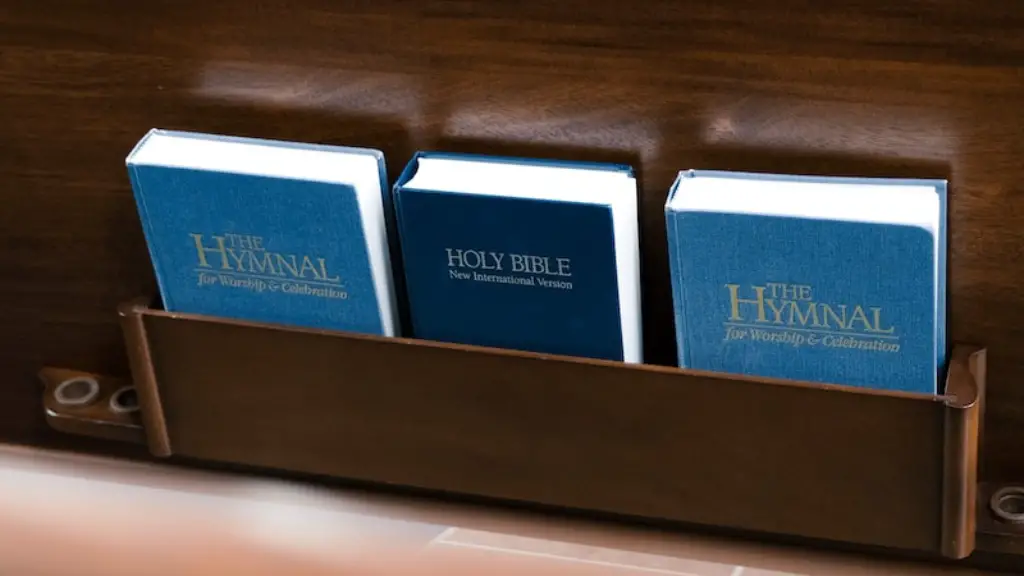The debate over the books left out of the Bible has been a contentious issue among theologians and scholars for centuries. While some claim that the books were intentional omissions, others contend that they were lost in time and their relevance relegated to legendary status. With so much speculation, it can be difficult to discern the truth.
Contrary to popular belief, the Bible is not a single book. Instead, it is a collection of 66 books – 39 from the Old Testament and 27 from the New Testament – that were composed and compiled over the centuries by numerous religious writers. Although they were carefully, selected by a group of religious scholars and leaders called the Council of Trent, some books that could have rightfully been included in the Bible were excluded. Among them are 1, 2 and 3 Maccabees, the Prayer of Manasseh, the Psalm of Solomon, and the Infancy Gospel of Thomas.
The 1, 2, and 3 Maccabees were texts about the Jewish revolt in Judea during the 1st century BC and were included in the Septuagint, the Greek translation of the Hebrew Bible. While their significance is undeniable, their status as divine truth was questioned and they were ultimately excluded from the Bible. Similarly, the Prayer of Manasseh, the Psalm of Solomon, and the Infancy Gospel of Thomas were viewed as potentially inaccurate sources of information and were left out.
Besides the four books mentioned, there are many other books that have noteworthy historical, poetic and religious value and could have easily been included in the Bible. For example, the book of Enoch, an extra-biblical manuscript, discusses the fall of angels, Noah’s flood, the coming of the Messiah and other themes that are found in the Bible.
In the centuries since the Bible’s canonization, theologians and scholars have reflected on why these books were excluded. Some argue that they contained more myth than reliable historical fact, while others say they contained competing doctrines that would have divided Christianity.
Still others maintain that the exclusion of these books was intentional – that some Church leaders wanted to maintain their power by hiding certain aspects of Christian faith from the masses. They posit that these texts contained teachings about equality and the true power of the Holy Spirit that were seen as a threat by an organization trying to maintain order and suppress individual’s spiritual growth.
Regardless of the reason for their exclusion, when we look at the Bible today it is evident that certain books are missing. We can only speculate about why these particular texts were omitted from the Bible, as the true answer is likely to remain a mystery.
The Role Of The Church In The Bible’s Canonization
The formation of the Bible was not just a matter of religious writers spontaneously deciding which texts to include or omit. Instead, the process of canonization is deeply intertwined with the history of the Church.
The first canon of the Bible was approved by the early Church at the Council of Rome in 382 AD. At this council, Pope Damasus sought to unify the various interpretations of the various Church teachings and codify which books should be treated as sacred and divine.
Despite its good intentions, the Council of Rome was only the beginning of a lengthy process that would continue for centuries. In 1566, the Council of Trent reaffirmed the canon of Scripture that had been set in previous centuries and mandatorily excluded seven books that had been previously approved by other councils.
Since then, the process of canonization has been regularly reevaluated and debated by religious scholars and theologians. Despite the Church’s role in the formation of the Bible, some scholars still maintain that many books were still left out.
Communication Gap Between Man And God
It is important to consider the possibility that the Bible was incomplete due to a communication gap between man and God. Humanity is limited by time and space, and we only have access to a limited amount of divine knowledge.
Man is also fallible and has historically made mistakes, particularly in matters related to faith and spirituality. It is troubling to consider that with our current limited access to the divine, we may never really know the true story of why the books were left out of the Bible.
In addition, some theologians claim that any search for the truth of the Bible that goes beyond the original text is an exercise in inconsistency. They point out that the Bible, like everything else in the human realm, is imperfect, and that trying to uncover the truth is a fool’s errand.
Still, the debate over which books were left out of the Bible continues to rage on. As new discoveries are made and theories are presented, some will stand by the traditional interpretation of the Bible, while others will pursue their own search for the truth.
Scholarly Perception Of The Omitted Books
The scholarly perception of the omitted books varies greatly. While some theologians consider them to be insignificant, others praise their content as some of the most intriguing stories found in the Bible.
For example, the Book of Enoch is considered by some to be an important text that was either omitted or lost during the canonization process and it is sometimes included in modern-day Bibles. This book contains stories about the fall of the Watchers (angels) who left their heavenly abodes to live among humans on Earth, and it is seen as a supplemental source of divine knowledge.
Similarly, the so-called “Apocryphal” books such as 1 Maccabees and 2 Maccabees have been praised for their historical information and the insight they provide into Jewish culture during the time period they depict. These books are often collectively referred to as “deuterocanonical” or “intertestamental” literature, and their stories have been embraced by some religious leaders.
The Infancy Gospel of Thomas is another book that has captured the imaginations of scholars and theologians alike. This book contains stories about Jesus’ childhood and is considered to be a valuable source of supplemental historical facts about Jesus. Its content has been both celebrated and criticized, and it has played a significant role in the debate over the books left out of the Bible.
The Impact Of The Omitted Books On Christianity
The impact of the omitted books on Christian orthodoxy is difficult to measure. Some argue that the books provide additional historical evidence of the accuracy of the Bible while others claim they contain alternative interpretations of core doctrines that could have divided Christianity.
According to some theologians, if the omitted books had been accepted as canonical, Christianity would have been much different today. They point out that these books contain stories about individual’s spiritual journeys, the divine feminine, and the reality that knowledge is an ever-evolving process – ideas that have been largely disregarded in most traditional interpretations of the Bible.
At the same time, some Church leaders view the omission of these seven books as a positive move. They claim that the additional stories and interpretations could have caused confusion and diverged from the one true path that Jesus laid out in his teachings.
Regardless of one’s perspective, it is clear that the books left out of the Bible have had a long-lasting impact on Christianity and its interpretation. Whether the books were intentionally left out or lost in time, the process of canonization has left a permanent mark and continues to be a source of debate.
Theological Implications Of Omitting Books From The Bible
The implications of omitting books from the Bible are still a source of great debate among theologians. Some argue that omitting books was a necessary step in understanding the core message of the Bible and keeping Christianity unified. Others point out that the lack of inclusion of these books is a source of lost divine knowledge and would have changed the course of Christianity in profound ways had they been included in the Bible.
Still, others argue that the omitted books provide important insight into the Bible and that by omitting them, we are missing out on valuable spiritual knowledge. From the view of these theologians, it is important to consider these books, even if they were not included in the Bible, as they may provide further insight into one’s understanding of the divine.
The truth is that we may never know why the books were left out of the Bible, but that doesn’t mean their stories don’t still hold meaning and value. In fact, the stories of these books can provide a powerful window into our spiritual journey and help us to understand the power of faith and the importance of truth.
Evolution Of The Bible
The evolution of the Bible is an ongoing process that involves re-examining its core texts and evaluating its relevance in light of modern times. This process is both complex and controversial as our understanding of the divine is constantly shifting.
The debate over the books left out of the Bible has raged on for centuries and shows no sign of abating. As more and more theologians argue over the decision to exclude certain books, it is important to remember that the Bible was not the product of a single individual or religion. It was a collective effort to create a sacred text that unified the world’s Christian beliefs.
This understanding should inform our ability to discuss this topic in a respectful and dignified manner. We should embrace the differences among us, and recognize that our individual paths to spiritual truth may lead us in different directions.
Reconciling Historical And Spiritual Perspectives
The debate over the books left out of the Bible can seem overwhelming, particularly as it involves reconciling both historical and spiritual perspectives. Ultimately, however, this debate is a source of strength.
By engaging in honest conversations about the omitted books and reexamining our preconceived notions of faith and spirituality, we are able to gain a better understanding of ourselves and the divine.
The true answer to why these books were left out of the Bible is likely to remain a mystery, but that does not mean their stories should be forgotten. Our understanding of the divine is constantly evolving, and by embracing the debate we can expand our collective knowledge and come closer to discovering the truth.
The Role Of The Council Of Trent
The Council of Trent was a 16th century assembly of Catholic bishops and theologians convened in response to the Protestant Reformation. During their meeting, the members of the council sought to codify the Christian faith by affirming the core beliefs of the Church and establishing a final list of books that should be included in the Bible.
When the Council of Trent ended, the Seven Deuterocanonical Books, which included 1 and 2 Maccabees, the Prayer of Manasseh, and the Psalm of Solomon, had been officially excluded from the Bible. Their decision was final, and the books were





